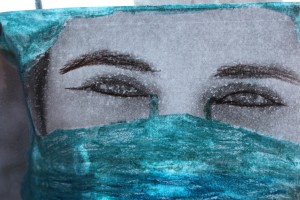Tears for the Prophet
“The sweetest of relationships is that with the Prophet;
all the rest are meaningless!
The Creator created you [Muhammad] in the highest rank.
My moist eyes…
The Lady Amina gave birth to the Lord smilingly.
My moist eyes…
O Muhammad, the Arab, I, “the rebel,” am afraid
My moist eyes…” (Poem by ‘Abd ur-Ra’uf Bhatti)
This poem, which was in Professer Asani’s article in the week 4 readings, depicts the experience of reading the hadith, the collections of sayings of the prophet Mohammed, and crying because his words are so moving. The lines are continuously cut off by the refrain “my moist eyes” to show that the author is so touched by Mohammed that he is speechless and can do nothing but weep. Unlike in some of his other poetry, in which he uses the third person, Bhatti chooses to use the first person in this poem. This highlights the deeply personal effect that reading the Hadith and the Qur’an have on Muslims, and demonstrates that one should form ones own relationship with the Prophet.
My creative response to this poem is a self-portrait in which you can only see my eyes. I am crying from reading the words of the prophet Mohammed in the Hadith, and also as a way of imitating him. As my tears flow, they are becoming a hijab that covers my face and my head and protects me from the world. My face is devoid of color to highlight the intensity of my tears, which are a vibrant blue. I decided to create this visual representation in order to demonstrate the power of crying, not only within this poem, but in the Muslim world. As we have discussed in lecture, many Muslims make themselves cry when they read the Qur’an with the hope that if they continue to do this, it will eventually happen naturally. Crying is a sign of piety, and even in place where people don’t show any emotions at all it is important to cry when one reads the Qur’an. Shii Muslims also cry when they see the Taziyeh in Iran because they are so moved. Crying is important because it shows that one is connecting on a deep level with Allah, who is lovesick and created the world because he wanted to connect with people.
